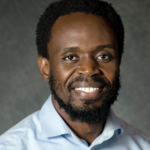Fellows

Gerald Ipapa
Gerald Ipapa is a Postdoctoral Fellow at Georgetown University. He holds a Ph.D. in Economics and an M.S. in Economics and Applied Econometrics from the University of Delaware, an M.A. in International Development from Georgetown University, and a B.S. in Mathematics and Statistics from Egerton University. His recent peer-reviewed research includes an acceptance at the Review of Economics and Statistics. His current research focuses on studies in Kenya and covers topics in development economics, particularly education, health, labor, and the environment.
Previously, Gerald was a Research Manager at Innovations for Poverty Action (IPA), where he oversaw more than half a dozen research projects, and was a Consultant with the Development Economics Research Group (DECRG) at the World Bank. Until recently, he was a lead instructor at the University of Delaware, teaching development economics.

Michelle Kaffenberger
Michelle Kaffenberger is the Head of Evidence Translation for the What Works Hub for Global Education and a Senior Fellow with gui2de and the McCourt School of Public Policy, Georgetown University. She is also a Research Fellow with the Blavatnik School of Government, University of Oxford.
With the What Works Hub for Global Education, Michelle leads and oversees multidisciplinary research and policy synthesis to improve foundational learning in low- and middle-income countries, with a focus on translating evidence into actionable insights for practitioners and policymakers. She provides strategic leadership and management to the evidence translation team and workstreams and contributes to cross-program learning, strategic partnerships, and policy engagement.
Previously, Michelle was Deputy Director of Research and Research Fellow with the RISE Programme at the University of Oxford, where she conducted research on improving education system alignment for learning, and led strategy, programmatic and research activities. Michelle has also served as Senior Research Advisor with the World Bank, helping launch a new global partnership for social protection system reform. She has consulted for and advised bilateral and multilateral organizations, major philanthropic donors, non-governmental organizations, and private sector actors. Her research has been covered by the Economist, Financial Times, CNN, and national newspapers in Kenya, Tanzania, and Indonesia (among others).
Michelle began her career establishing a new base of operations for an international nonprofit in Darjeeling, India. She holds an M.A. in Economic Development from Vanderbilt University, and a B.A. in Political Science from Ohio University.
Associates

Benjamin Daniels
Benjamin Daniels is a Research Associate at gui²de. Benjamin’s research focuses on the delivery of high-quality primary health care in developing contexts. His work on data from India, Kenya, South Africa, China, and other locations has highlighted the importance of direct measurement of health care provider knowledge, effort, and practice. He has supported some of the largest research studies to date utilizing clinical vignettes, provider observation, and standardized patients. Benjamin is a member of the QuTUB Project team.
Benjamin also works as a consultant with DIME Analytics at The World Bank to improve the reproducibility, transparency, and credibility of development research. This work comprises code and process development, research personnel training, and direct support for data analysis and survey development. These tools include software products like iefieldkit and ietoolkit, research resources like the DIME Wiki and the Data for Development Impact resource guidebook.
Benjamin’s academic work can be found on Google Scholar or on the publications page. His Stata code can be found on SSC, on GitHub, or on the sidebar links.
